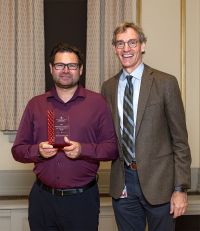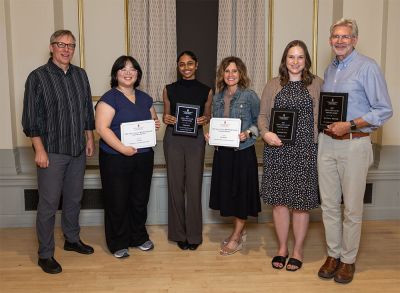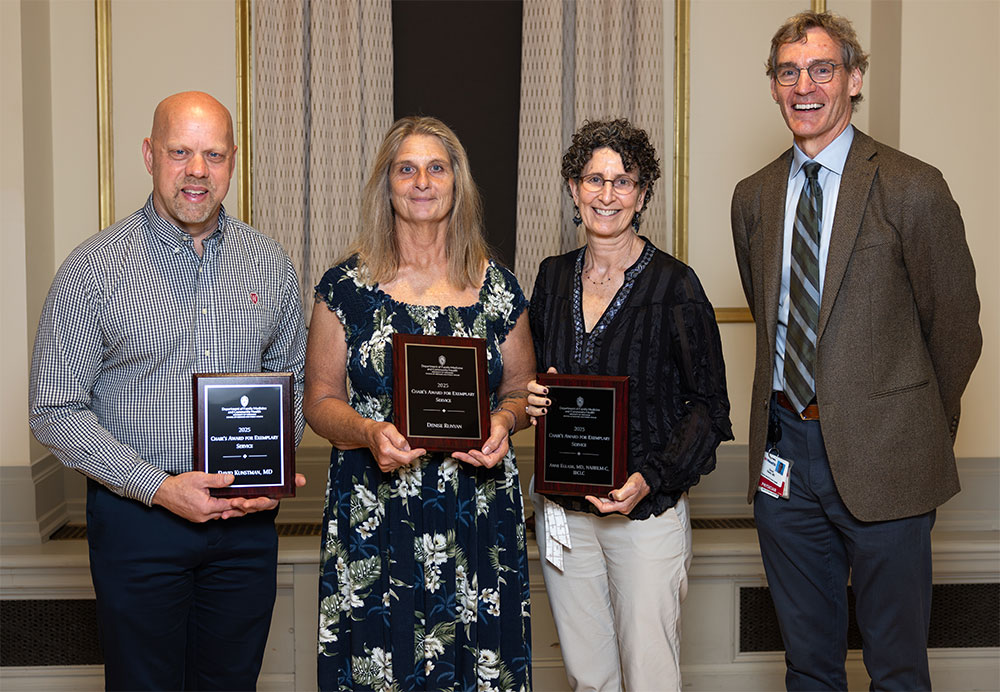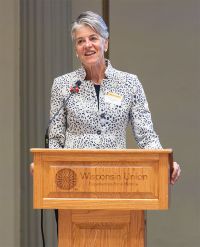At the Farley-Frey Awards celebration on September 29, one theme stood out: connection. From heartfelt stories to quiet moments between patients and caregivers, it was clear that shared experiences matter. The Frey Writing Awards, Farley Visiting Professorship, and Paster Family Foundation Salutogenic Science Award each honor the ways we bond through words and actions.
Eugene and Linda Farley Visiting Professor: Dr. Christine Sinsky
This year’s speaker, Dr. Christine Sinsky, emphasized the impact that listening to patients has had on her long career. An internal medicine physician and former vice president of professional satisfaction at the American Medical Association (AMA), Sinsky has long championed a health care system that honors the humanity of both patients and clinicians.
In his introduction, Dr. Brian Arndt praised Sinsky’s unwavering dedication to restoring meaning in medicine, highlighting her advocacy for physician well-being and her efforts to improve clinical workflow.
Sinsky shared the lessons and stories that have shaped her life—from her early days as a medical student at UW–Madison to her residency in La Crosse, Wisconsin, where she and her husband balanced childcare between rotations, to the practice they built together in Iowa over the past 32 years. As a physician, business owner, and insurer, she developed a broad perspective on decision-making and learned the importance of autonomy and control in the clinical environment.
Along the way she developed a passion for restoring the soul of medicine by addressing burnout and inefficiency and by nurturing the human connections that make healing possible. “I had the good fortune to spend 12 years at the AMA,” she said. “There, I worked with an incredible team to help create the conditions where joy, purpose, and meaning in work were possible for physicians and their teams.”
Sinsky distilled her experience into three enduring lessons: radical optimism, robust relationships, and deep respect. “We must believe that we can help patients live better lives and that the system can be better,” she said. Relationships, she emphasized, are the foundation of effective care. “They’re our superpower.”
Efficiency, she added, should create space for connection— not just more appointments. “Spend a couple of minutes getting to know the patient,” she advised. “That investment pays off.”
Sinsky shared stories of patients whose passions, like gardening, painting, and trains, reshaped clinical encounters. One longtime patient, Sister Mary, brought a didgeridoo, an Australian Aboriginal wind instrument, to the clinic and later gifted it to Sinsky as her health declined. “She gave me a lesson—and the didgeridoo, which I displayed on my mantle for many years.”
Sinsky closed with a story about a nurse colleague whose kindness helped a patient disclose domestic violence. “Every day,” the nurse shared, “I pick one encounter I’ve done right—for myself—as the reason I came to work today.” Sinsky urged her colleagues to do the same and embrace radical optimism. “The work we do is so important.”
Paster Family Foundation Salutogenic Science Award: Dr. Andrew Quanbeck

Andrew Quanbeck, PhD, accepts the Paster Family Foundation Salutogenic Science Award from Dave Rakel, chair of the Department of Family Medicine and Community Health.
Another special moment came during the presentation of the Paster Family Foundation Salutogenic Science Award. Recipient Andrew Quanbeck, PhD, head of the Implementation Science and Engineering Lab at UW–Madison, reflected on the deep personal roots that led him into health systems science.
“I dedicate this award to my parents,” he said, gesturing to a cherished photo from his PhD graduation ceremony in 2012. His father, a urologist, and his mother, a nursing educator, met at UW–Madison in the 1960s and built a life of service. “My dad worked long hours, but Saturdays were ours,” Quanbeck recalled. “We’d listen to WPR and the Zorba Paster show—his laugh and curiosity about health stuck with me.” His mother’s resilience was equally formative. Diagnosed with a rare myeloma in 2008, she defied the odds and lived another decade. A scrap of paper she kept at her desk still inspires him: “Philosophy of health equals: keep the human body well… but it is changing.” That idea—that health is evolving—has stayed with him.
This philosophy also informed Quanbeck’s work in mobile health (mHealth), the use of mobile devices to support medicine and public health. In one study, his team used a digital medicine intervention to support people with mild to moderate alcohol use disorder. More recently, he has focused on substance use disorder and a de-implementation strategy aimed at safely reducing opioid prescriptions in favor of alternative pain management approaches like yoga or acupuncture.
Quanbeck also paid tribute to his wife, Jamie, a school librarian and the family’s memory keeper. “Jamie was there every step of the way,” he said, describing her role in caring for his parents and preserving their legacy through journals and scrapbooks. “She helped my mom transition to long-term care and held onto the mementos that mattered.”
He emphasized that the award represents more than a professional milestone—it is a testament to the optimism and resilience that carried his family through difficult times. “Even when things feel like they’re changing for the worse, there are always bright spots,” he said. “Just days ago, we saw a breakthrough in personal health research funding. It’s a reminder that progress is possible.”
As he continues his work, Quanbeck hopes to honor his parents’ legacy and inspire future generations—including his own children, now in high school—to carry forward the values of care, curiosity, and hope.
Learn More
Frey Writing Awards
The night also included recognition of this year’s John Frey Writing Award recipients. The Frey Writing Awards were established in 2010 to honor John Frey, III, MD, past chair of DFMCH, and to recognize and encourage individual creative writing.

Frey Writing Award recipients with Randy Ballwahn, who presented the awards. From left: Randy Ballwahn, Iris Chiou, Vibhusha Kolli, Shari Barlow, Caitlin Regner, and Jon Temte.
Winners
- Wait for Me (Maureen Goss)
- an accidental naturalist (Jon Temte, MD, PhD)
- I See You Everywhere, Amma and Promise No Wait Time (Vibhusha Kolli)
Honorable Mention
- Letting Go (with Love and a Lab Coat) (Shari Barlow)
- Stranger in a Strange (Home)Land (Iris Chiou)
- There is No Aversion to Love (Caitlin Regner, MD)
- Ask About Her Dogs (Markayle Schears)
Chair’s Awards
The celebration concluded with a presentation of the Chair’s Awards by DFMCH Chair Dave Rakel. The awards were given in recognition of outstanding careers at DFMCH.
- Anne Eglash, MD
- Dave Kunstman, MD
- Denise Runyan

Chair’s Award recipients with Dave Rakel, chair of the Department of Family Medicine and Community Health. From left: Dave Kunstman, Denise Runyan, Anne Eglash, and Dave Rakel.
2025 Farley-Frey Event Photos
Published: October 2025

